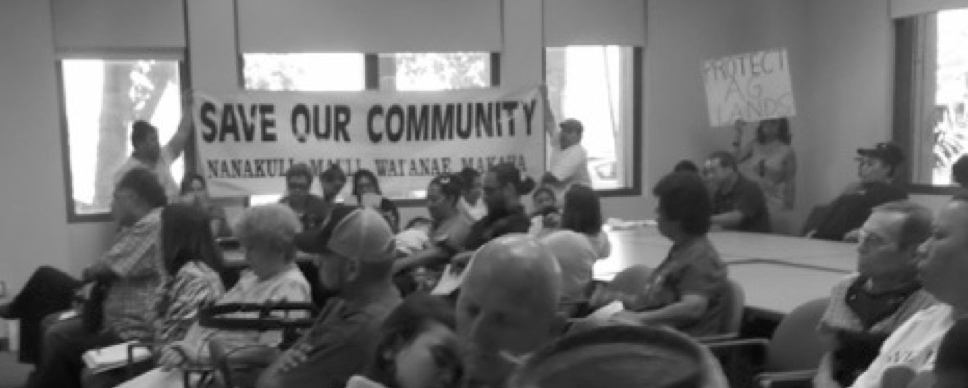Posted 05/02/2011
 At last month’s Honolulu Planning Commission meeting at Kapolei Hale, a handful of West O`ahu farmers tried to dispel the notion that the 96 acres in Nanakuli proposed for development of a light industrial park are unfit for farming
At last month’s Honolulu Planning Commission meeting at Kapolei Hale, a handful of West O`ahu farmers tried to dispel the notion that the 96 acres in Nanakuli proposed for development of a light industrial park are unfit for farming
“If I can grow a plant in broken glass parts, in peat moss … anyone can farm anywhere if they want to,” Nanakuli farmer Gerald Booth said at the commission’s hearing on proposed changes to the Wai`anae Sustainable Communities Plan. Those changes, which the commission will decide on later this month, include a new urban zone at one spot along Lualualei Naval Access Road to accommodate the park.
While landowner Tropic Land, LLC, and park proponents have claimed the land is too rocky and too dry to farm successfully, Booth testified that the last farmers on the land, the Araki brothers, “put in the time, sweat equity, and [soil] amendments” to produce high-quality crops. Unable to afford an increase in rent, however, the farm closed decades ago. “They were as surprised as I was that their rent was not accepted to continue. … All the effort they put in was gone,” Booth said.
Although the brothers used only about a dozen acres of the proposed park site, Booth argued that more than 50 acres are farmable.
“There’s more than sufficient land for five- or ten-acre plots,” he said.
Nearby farmers Faith Arakawa and Everett Nakata also testified against the proposed upzoning, which some have claimed is spot-zoning.
“I feel like I’m lady Macbeth — out damn spot!” Arakawa said, adding that Wai`anae is one of the last areas on O`ahu with good farm land.
To this, farmer Roberta Searle, speaking on behalf of Tropic Land, pointed out that Wai`nae has plenty of agricultural land, about 140,000 acres. She added that the company will be providing land on the perimeter of the proposed industrial park to the non-profit organization she works with to be used as an agribusiness incubator.
“We are not trading off or out agricultural lands. We are trading up,” she said.
Whether or not the Planning Commission agrees remains to be seen. The majority of the members of the state Land Use Commission, however, don’t appear concerned about the potential loss of farm land.
On April 18, a few days before the LUC voted on Tropic Land’s petition to reclassify its land as Urban, former state Department of Agriculture director Yukio Kitagawa asked the commission to reject it.
“Many years ago, when I was with the College of Tropical Agriculture, I worked with the producer who began farming the land in question. I can tell you that the land was productive and successfully produced quality eggplant, bell pepper, and cucumber to name a few, despite the claim by some that the soil is inherently not the best. In fact, a good percentage of the productive crop lands in the valley is the same soil type,” he wrote.
Despite Kitagawa’s arguments, the commission voted 5-3 on April 21 to place the project site in the Urban District. Although the commission fell one vote short of approving the boundary amendment, those who opposed the redistricting were almost exclusively concerned about adequate access to the site, which Tropic Land has so far failed to secure.
Read Kitagawa ‘s testimony.


Leave a Reply